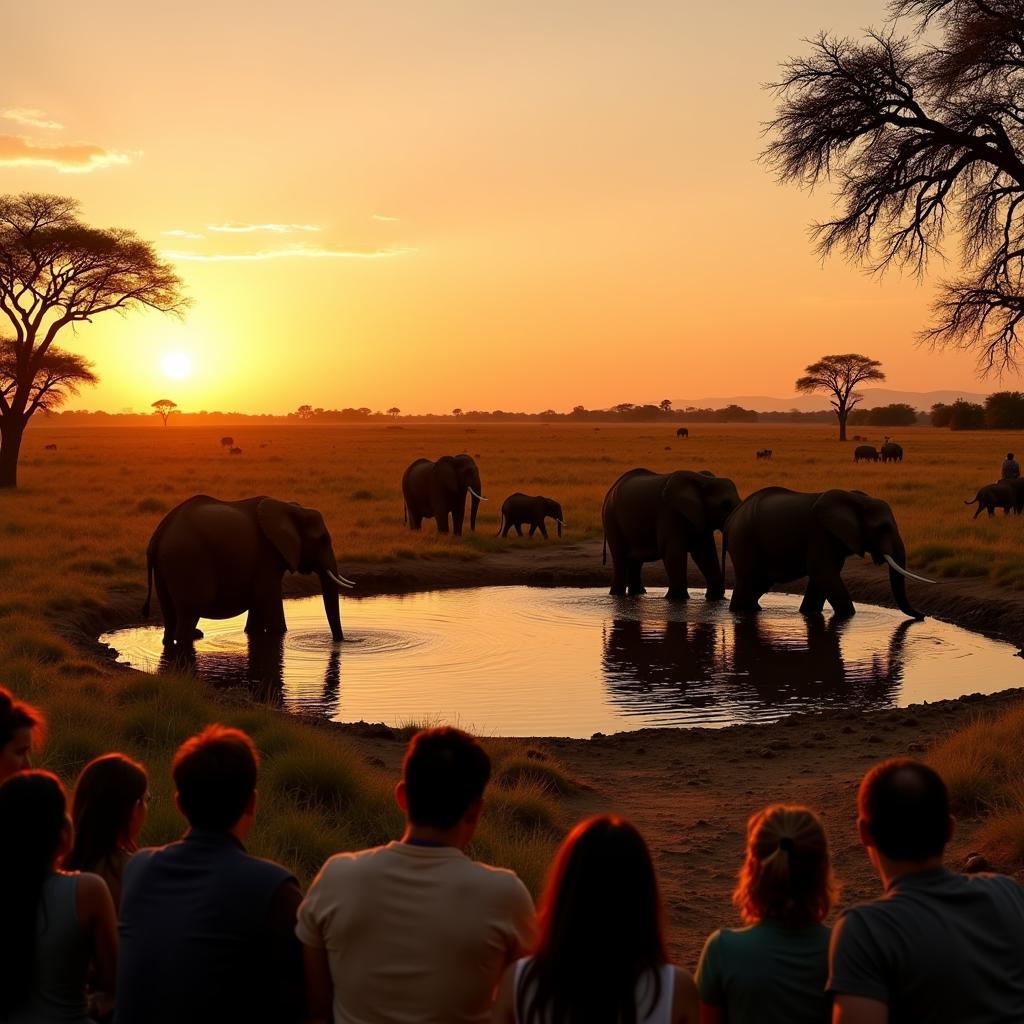Unveiling the African Forest Elephant Habitat
The African Forest Elephant Habitat, a realm of dense vegetation and hidden wonders, plays a crucial role in the survival of this elusive giant. These magnificent creatures, smaller than their savanna cousins, have adapted to the unique challenges and opportunities presented by the forests of Central and West Africa. Let’s delve into the intricacies of their home and discover the importance of protecting this vital ecosystem. african elephants iin their habitat
Understanding the African Forest Elephant’s Domain
The African forest elephant habitat primarily consists of tropical rainforests, characterized by their high humidity, dense canopy, and diverse flora. These forests provide essential resources for the elephants, including food, water, and shelter. Countries like Gabon, Republic of Congo, and Cameroon are strongholds for these forest giants. They navigate through the thick undergrowth, creating paths that benefit other forest inhabitants. These elephants play a vital role in seed dispersal, shaping the forest structure, and maintaining its biodiversity.
Key Features of the Habitat
The African forest elephant’s habitat is characterized by a complex interplay of factors that contribute to its unique biodiversity. These include:
- Dense Vegetation: The thick foliage offers both sustenance and camouflage for the elephants.
- Abundant Water Sources: Rivers, streams, and forest pools provide vital hydration.
- Varied Food Sources: From fruits and leaves to bark and roots, the forest provides a diverse diet.
- Natural Shelter: The dense canopy offers protection from the elements and potential predators.
Threats to the African Forest Elephant Habitat
Sadly, the African forest elephant habitat faces significant threats, primarily due to human activities. These threats include:
- Deforestation: Logging and land conversion for agriculture destroy vital habitat and fragment elephant populations.
- Poaching: The illegal ivory trade continues to decimate elephant populations, driving them towards extinction.
- Human-Wildlife Conflict: As human settlements encroach upon elephant habitats, conflicts over resources become increasingly frequent.
Conservation Efforts
Recognizing the importance of preserving the African forest elephant habitat, various organizations and governments are working to implement conservation strategies. These efforts focus on:
- Protecting Existing Habitats: Establishing protected areas and national parks helps safeguard crucial elephant habitats.
- Combating Poaching: Strengthening anti-poaching patrols and law enforcement efforts helps reduce illegal hunting.
- Promoting Sustainable Development: Encouraging sustainable logging practices and land management helps minimize habitat destruction.
- Community Engagement: Working with local communities to promote co-existence between humans and elephants is crucial for long-term conservation success.
Dr. Imani Ochieng, a leading expert in African elephant conservation, emphasizes the interconnectedness of the ecosystem: “The African forest elephant is not just an inhabitant of the forest, but a vital architect of its future. Protecting their habitat is essential for maintaining the biodiversity and ecological integrity of the entire region.”
african jungle animals and man videos
What is the future of the African Forest Elephant?
The future of the African forest elephant remains uncertain, but with continued conservation efforts and global cooperation, there is hope for their survival. Protecting their habitat is not just about saving an iconic species, but about preserving a vital ecosystem that benefits countless other species and plays a crucial role in regulating the global climate. Professor Aboubacar N’Diaye, a renowned ecologist, highlights the urgency of the situation: “The time to act is now. The future of the African forest elephant depends on our collective commitment to protecting their habitat and ensuring their long-term survival.” african jungle safari
In conclusion, the African forest elephant habitat is a complex and vital ecosystem that faces numerous threats. By understanding these challenges and implementing effective conservation strategies, we can ensure the long-term survival of these magnificent creatures and protect the biodiversity of African forests for generations to come. The African forest elephant habitat requires immediate and sustained attention to prevent its further degradation. african bush elephant amboseli
When you need assistance, please contact us: Phone Number: +255768904061, Email: kaka.mag@gmail.com or visit our address: Mbarali DC Mawindi, Kangaga, Tanzania. We have a 24/7 customer service team.


